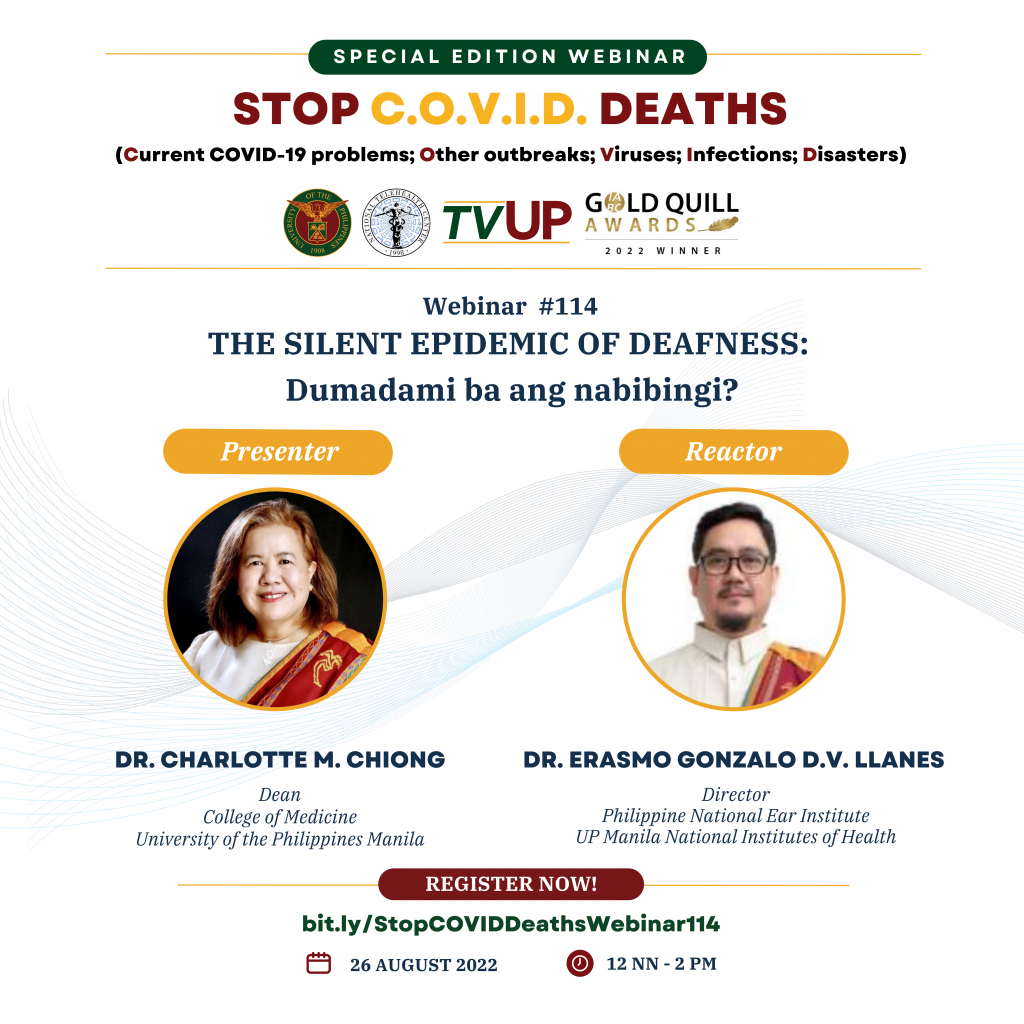
- This event has passed.
Stop COVID Deaths Webinar #114 “THE SILENT EPIDEMIC OF DEAFNESS: Dumadami ba ang nabibingi?”
August 26, 2022 @ 12:00 pm - 2:00 pm

The University of the Philippines in partnership with
UP Manila NIH National Telehealth Center and in cooperation with
UP Philippine General Hospital
would like to invite you to join the Fight Against COVID-19!
Registration slots are limited to this SPECIAL EDITION of
the STOP C.O.V.I.D. DEATHS Webinar Series.
(Current COVID-19 problems; Other outbreaks; Viruses; Infections; Disasters)
So sign up NOW:
bit.ly/StopCOVIDDeathsWebinar114
Webinar #114
August 26, 2022 (Friday) 12nn
“THE SILENT EPIDEMIC OF DEAFNESS: Dumadami ba ang nabibingi?”
Presenter:
Dr. Charlotte M. Chiong
Dean
College of Medicine
University of the Philippines Manila
Reactor:
Dr. Erasmo Gonzalo D.V. Llanes
Director
Philippine National Ear Institute
UP Manila National Institutes of Health
———————————————————–
Webinar #114
August 26, 2022
“THE SILENT EPIDEMIC OF DEAFNESS: Dumadami ba ang nabibingi?”
The World Health Organization estimates that about 430 million people or 5% of the world’s population require rehabilitation to address hearing disability. The University of Santo Tomas Faculty of Medicine and Surgery reported in 2020 that the prevalence of moderate to severe hearing loss in the Philippines is 15%.
Why are more people becoming deaf in the Philippines?
The risk for deafness is from womb to tomb. Genetic factors – hereditary and non-hereditary causes are a risk. Infections during pregnancy like rubella are still a problem despite the availability of vaccines. Chronic ear infections among children can result in future hearing loss when not properly treated. There has been increasing concern about deafness due to the risk of permanent, avoidable hearing loss from unsafe listening practices among 1 billion young adults. Exposure to work-related chemicals, constant exposure to loud noise and loud sounds, as well as trauma to the ear or head can cause deafness. Among adults and seniors, chronic diseases, smoking, viral infections and certain drugs and medicines can cause deafness and hearing loss.
Deafness has many serious effects. Among children this is an impediment to learning and emotional development. Among adults this can lead to social isolation, loneliness and stigma. Among seniors, more recent research published in the Lancet 2020, reports that hearing loss is one of the top risk factors for dementia.
How can we tell if a patient is suffering from hearing loss? Can this be detected in young children? What are the red flags to alert a mother that a child may be deaf? How can we tell if an older person is becoming deaf? Is it “normal” for older persons to lose their sense of hearing?
In this episode of STOP COVID DEATHS, we take on a neglected and poorly understood epidemic that has been silently affecting millions of Filipinos. Dean Charlotte Chiong of the UP College of Medicine, one of the country’s leading experts in deafness will discuss the landscape for deafness in the Philippines and how frontline workers can support efforts to prevent deafness and early detection. Philippine National Ear Institute Director Erasmo Gonzalo Llanes will discuss practical tips on how to prevent hearing loss among Filipinos.
Join your credible on-line community as we unpack the barriers to addressing the epidemic of deafness in the Philippines.
Together, we can STOP C.O.V.I.D. DEATHS!
